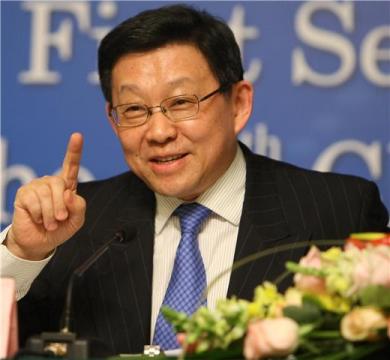|

CHEN Deming
Minister of Commerce
People's Republic of China
China and India are both ancient civilisations endowed with a rich history. Cultural exchanges and commercial ties between the two countries date long back. Chinese monk Fa-Hien who travelled to India to seek Buddhist scriptures is one instance of the long friendship between the two peoples. Today, having embarked on a fast drive towards economic and social development, both China and India are demonstrating Asia's rise to the rest of the world.
As the two largest developing countries, China and India share similar national realities and are at similar development stages. Plus, their economies are strongly complementary to each other. It is in the interests of both their populations that China and India deepen bilateral economic and trade relations today. Thanks to concerted efforts on both sides, trade and economic cooperation has seen great progress.
The China-India trade grew from $2.9 billion in 2000 to $51.8 billion in 2008, an 18-fold increase and a 43% annual growth rate. China is India's largest trading partner while India is China's top trading partner in South Asia. Cooperation in infrastructure construction has been moving forward rapidly. Since 2006, Chinese companies have completed engineering projects with a cumulative value of $11.1 billion in India, and these projects have helped improve the condition of India's infrastructure. Mutual investment has been increasing steadily. Cumulative Indian investments in China have exceeded $300 million while Chinese investments in India amounted to $250 million.
Since India is well known for its IT industry and China is good at manufacturing, the two can profit from each other's strengths. Given their mature technologies and the fact that they offer good value for money, Chinese companies and equipment are a good choice in India's quest to upgrade its infrastructure. Meanwhile, India's best practices in finance, education, healthcare and private economy are worth learning by China.
The two countries are undertaking the unprecedented pursuit of providing one-third of the world's population with the benefits of modernisation and industrialisation. So, they face similar challenges when moving forward. I agree with PM Manmohan Singh that there is ample space in the world to accommodate the growth ambitions of both the countries.
As far as the strategic mutual trust necessary for cementing the foundation for economic and trade relations is concerned, China and India are partners rather than rivals. Both their experiences show that only openness can lead to progress and only cooperation can lead to development,while losses incurred by protectionism outweigh the gains. China and India should resolve economic and trade issues through dialogue and consultation. As big countries in Asia, they are both engaged in regional cooperation. The two countries shall discuss regional trade arrangements with a forward-looking attitude to bilateral relations.
At present, the two-way trade is in favour of China, but China does not intentionally pursue a trade surplus. It has taken proactive measures in recent years to increase imports from India. In 2008, the Chinese side organised buying missions to India for the first time and purchased over $400 million worth of products. Committed to stimulating consumption, China invites Indian companies to explore the Chinese market and increase their exports to China.
On improving public services and creating a sound environment for cooperation, businesses are the main players in the trade and economic arena, and the two governments should take measures to facilitate business and personnel exchanges. Trade and investment facilitation should be advanced to create an equitable, transparent and predictable regulatory environment for companies of both countries. More information about the benefits of bilateral cooperation should be disseminated to dispel suspicion and enhance trust.
As far as strengthening cooperation in the multilateral arena and safeguarding the interests of developing countries are concerned, international systems are experiencing profound transformation. China and India are duty-bound to shape a new international economic order that is fair and rational, and to safeguard the legitimate rights and interests of the developing community. The two countries should strengthen their communication and coordination on major issues like the financial crisis, institutional reform for global governance, Doha Round negotiations and climate change.
This year marks the 60th anniversary of the founding of diplomatic relations between China and India. Looking back at history, we can see that the destinies of Chinese and Indian people have always been tied together. As Mahatma Gandhi once said, China and India have always stood together and gone the same way. I believe that in the 21st century China and India will live in greater harmony.
Article in Financial Express, India
|